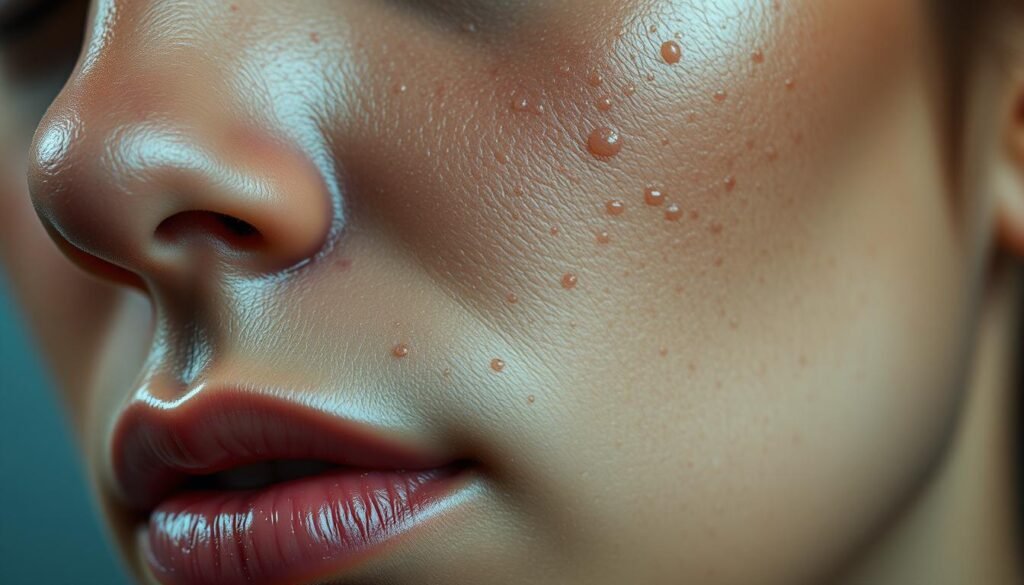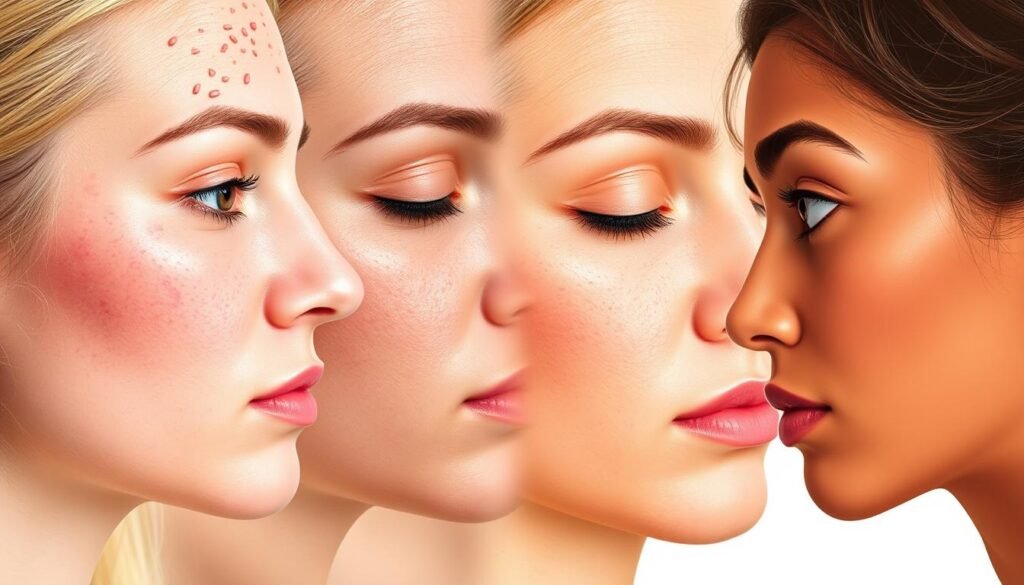Did you know that 68% of women with Polycystic Ovary Syndrome (PCOS) have skin issues like acne and oily skin? This condition isn’t only about irregular periods. It deeply impacts skin health because of hormonal imbalances. These imbalances cause too much oil production. This makes skin prone to acne and other skin problems.
This piece sheds light on how PCOS affects skin, mainly through hormonal imbalance. Knowing this connection helps women tackle PCOS and skin troubles better. The study at King Abdulaziz Medical City shows many PCOS patients face skin problems. It points out how crucial early detection and treatment are. For a deeper understanding, check the study here.
Key Takeaways
- PCOS affects about 1 in 10 women of childbearing age.
- Key skin problems are acne and oily skin.
- Hormonal imbalances play a big role in PCOS skin issues.
- Spotting PCOS early helps manage skin conditions.
- Getting advice from health experts is essential for proper care.
Introduction to PCOS
Polycystic ovary syndrome (PCOS) is a condition that affects many women of childbearing age. It is one of the most common hormonal disorders. Understanding the symptoms of PCOS is key to early detection and treatment.
Women with PCOS may face a variety of symptoms, including:
- Irregular menstrual cycles
- Weight gain or difficulty losing weight
- Acne and oily skin
- Hair thinning or excessive hair growth
PCOS often leads to issues like insulin resistance. This makes it hard to keep a healthy weight. Knowing the symptoms of PCOS is critical. Early action can improve both health and happiness.
Understanding Hormonal Imbalance
Hormonal imbalance is crucial in the development of Polycystic Ovary Syndrome (PCOS). Androgen levels that are too high are a main feature. These hormones, known as male hormones, are usually found in lower levels in women. But, having too much, especially testosterone, can cause issues. This includes acne and oily skin.
This problem happens when normal hormone activity is disturbed. Estrogen levels may change too. This shift leads to a series of effects on the body. It’s important to grasp how these hormones work together. For example, too much androgen can cause hirsutism. In hirsutism, women get too much hair in places usually seen in men.
It’s vital to know the effects of hormonal imbalance to manage them. For those dealing with PCOS and skin issues, it’s a key factor. Understanding the ups and downs of androgen and estrogen helps in tackling this condition. For more on PCOS symptoms and how to handle them, click here.

PCOS and Skin Changes
Skin challenges are tough for those with polycystic ovary syndrome (PCOS). Acne is a major issue they face. It’s key to know how PCOS affects skin health for better care.
Acne Development in PCOS
PCOS leads to severe acne for many women. Hormones cause more oil, clogging pores and causing acne. This situation can harm their self-esteem. It’s important to tackle these symptoms early on.
Impact of Insulin Resistance on Skin
Insulin resistance also changes the skin in PCOS. It makes it hard for women’s bodies to use insulin right, raising insulin levels. More insulin means more oil and worse acne. Grasping this insulin and skin link helps in finding good acne treatments for PCOS.
| Factor | Effect on Skin |
|---|---|
| Hormonal Fluctuations | Increases oil production, contributing to acne |
| Insulin Resistance | Elevates sebum production, worsening acne and skin changes |
| Androgens | Stimulates sebaceous glands, leading to oily skin |
The Link Between PCOS and Oily Skin
Polycystic ovary syndrome (PCOS) greatly affects the skin, causing it to be oily. This happens because of hormone imbalances in those with PCOS. They have more sebum production, making the skin greasy and breakout-prone. It’s vital to understand why PCOS leads to oily skin.
Why Oily Skin Occurs
Hormone changes in PCOS make the skin oilier. Androgens go up and push sebaceous glands to make more oil. Managing skin care becomes crucial for those experiencing this.
Genetics and what we eat also play roles. If oily skin runs in the family, you might have it too. Eating lots of refined carbs and sugars can make things worse. PCOS and oily skin are closely linked for many reasons.

Studies link PCOS to changes in the skin like insulin resistance. For more on how hormones and genetics affect PCOS and skin, check out these findings. Knowing these links helps those with oily skin from PCOS.
| Factor | Impact on Oily Skin |
|---|---|
| Hormonal Imbalance | Increased sebum production due to elevated androgens. |
| Genetics | Family history may predispose individuals to oily skin. |
| Diet | High intake of refined carbs can lead to increased oiliness. |
Other Skin Conditions Associated with PCOS
Polycystic Ovary Syndrome (PCOS) often leads to different skin conditions. These conditions show the hormone imbalances in the body. Knowing about them helps in treating PCOS better.
Hirsutism: Excess Hair Growth
Hirsutism means growing too much hair in places like the face, chest, and back. It is because of high androgen levels found in PCOS. This can make someone feel bad about how they look.
Studies show women with hirsutism often feel upset, which affects their life. It’s crucial to include solutions for this in PCOS treatment.
Alopecia: Hair Thinning or Loss
Alopecia causes hair to thin or fall out, mainly on the scalp. This problem can make women with PCOS feel more stressed. High androgen levels play a role in alopecia.
Getting the right help is necessary, both medically and emotionally. Fixing hair loss is important for many women to feel confident again.
Acanthosis Nigricans: Dark Patches on Skin
Acanthosis nigricans creates dark, soft patches usually around the neck and armpits. It shows insulin resistance, often found in PCOS patients. Dealing with this condition is a key part of PCOS care.
It’s helpful to know how insulin affects the skin. Various studies, like this one research article, explain it well.

Management and Treatment Options
To manage skin changes from Polycystic Ovary Syndrome (PCOS), a multifaceted approach is needed. Women can choose the best strategies for them by understanding the treatment options. These options include medications and lifestyle changes. They help fix the hormonal imbalances causing acne and other skin problems.
Medications and Their Effectiveness
There are several medicines for PCOS skin issues. Hormonal contraceptives can help balance periods and lower androgen levels, reducing acne. Anti-androgens, like spironolactone, block male hormones that lead to acne.
Common medications for acne connected with PCOS are:
- Oral contraceptives: Balance hormones and regulate periods.
- Spironolactone: Reduces excess oil production.
- Metformin: Helps with insulin resistance, aiding skin health.
Lifestyle Changes for Better Skin
Adding lifestyle changes in PCOS can greatly improve skin health. Exercise, eating right, and handling stress are key. Eating whole foods can balance hormones, helping tackle acne.
Below is a table showing good lifestyle changes and their benefits:
| Lifestyle Change | Potential Benefits |
|---|---|
| Regular Exercise | Improves insulin sensitivity and cuts stress. |
| Balanced Diet | Regulates hormones and supports healthy skin. |
| Stress Management Techniques | Lowers hormonal changes that can make acne worse. |
Getting advice from doctors is key for better health. Having regular check-ups helps catch problems early. This is especially true with PCOS and related issues like endometriosis. For more info, check out this guide.
The Role of Diet in Managing PCOS
Diet management is key to easing PCOS symptoms, especially skin problems. Healthy eating helps balance insulin levels. This is important for women with PCOS.
Healthy Eating to Combat Skin Issues
A balanced diet helps manage PCOS and skin issues. Foods low in Glycemic Index, like whole grains and vegetables, are good. They help control insulin and prevent acne.
Eating fruits and vegetables full of antioxidants is also good. Berries, spinach, and kale help fight inflammation. This can make the skin look better.
Having regular meals is important too. It helps keep energy steady and stops you from eating too much later. A good diet can help control acne and oily skin.
Recent studies suggest diet can really help with PCOS. According to this research, certain diets improve hormones and metabolic health.
Conclusion
Many people struggle with PCOS skin changes. The article talked about hormonal imbalances, insulin resistance, and how they lead to acne and oily skin. Knowing these factors helps those with PCOS find the right treatments.
Handling PCOS well means getting diagnosed early and having a plan that fits you. This plan might include medicine, new habits, and changes to what you eat. Taking a whole-body approach is key to dealing with skin issues from PCOS.
Getting help from experts is crucial for those dealing with PCOS and its effects on the skin. With the right support and care, it’s possible to overcome these problems. This allows people to feel better about their skin and themselves.